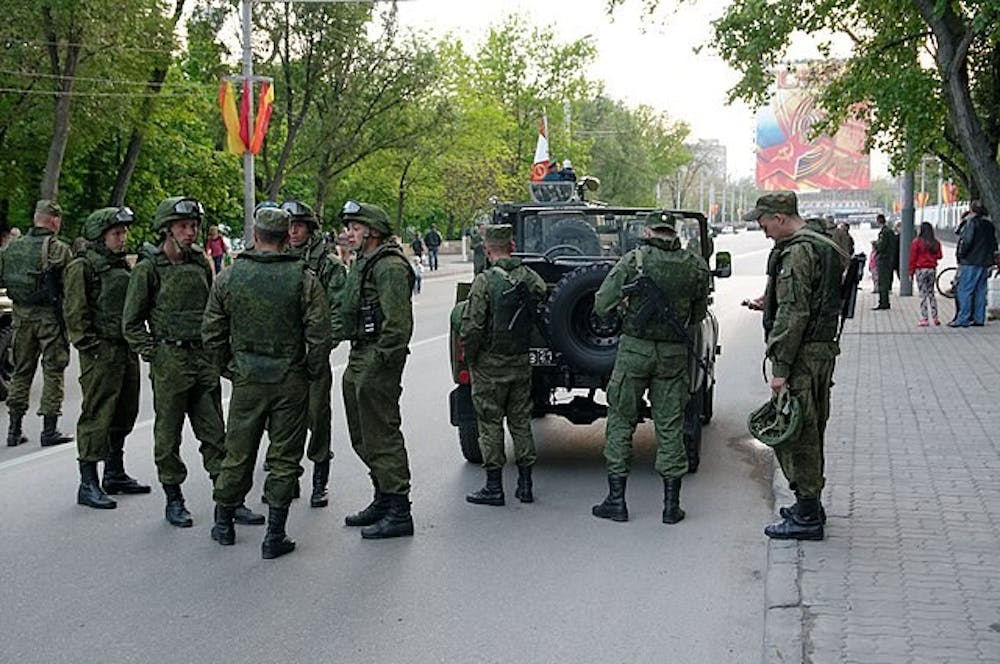In these early days of 2022, we find ourselves staring down the beginning of a third world war. Russia, a sputtering power whose days of strength are fast-waning, is poised to invade Ukraine and either install a puppet government or outright annex the territory. While Ukrainians helplessly look on as Russian tanks and troops gather on their doorstep, it is up to the rest of the world to decide whether or not this conduct can stand. For the U.S., there is both a moral and security requirement that dictates the clear course of action — stand up to Russia.
For the past 20 years, under the tin-pot dictatorship of President Vladimir Putin, Russia has actively sought to build a sphere of influence through violence and disregard of the popular will of the people they impose on. In 2008, Russia invaded Georgia and seized the territories of Abkhazia and South Ossetia when Georgia began to embrace the West as a trading partner and political ally over Russia. In 2014, when Ukrainians ousted their corrupt leadership from power in the hopes of gaining closer ties with the European Union, Russia retaliated by supporting a separatist insurgency and seizing Crimea. Now, Russia is posturing to again aggress against Ukraine, forcing the country to become a vassal for daring to look to break free from Russian influence.
Russia is quite transparent as to their motives. Russia demands that the North Atlantic Treaty Organization remove troops from former Soviet territories — the free, independent nations of Poland, Estonia, Lithuania and Latvia. By removing troops, these countries — who are members of the EU — will be left vulnerable to future threats of Russian aggression. For the people of these countries, as well as Ukraine, the stakes are clear — failure to resist Russian aggression will see their freedoms and sovereignty checked to serve the Kremlin’s wishes.
For the U.S., the stakes have never been higher as well. Firstly, the U.S, along with other global powers, has a moral obligation to defend Ukraine and counter Russian aggression. The United States has long stood for the democratic principles of popular sovereignty and respect for international law. While it does, of course, have a mixed history abiding by these principles, the U.S. has long served as a bastion of democracy and freedom to oppressed peoples the world over. To sit back now and watch the Ukrainian people lose their democratic government would be an abjection of America’s moral duties.
There is also a pressing national security need to defend Ukraine from Russia. To allow Russia to act in this manner without serious repercussions will only encourage further aggression, or another foreign power eager to copy their antics. Such conflicts, should they occur, may very well result in mass civilian casualties, the formation of insurgent and terrorist groups or even risks nuclear disaster — lest we forget Russia possesses the world’s largest nuclear arsenal.
To give Russia the message that they can continue to act with impunity and treat sovereign nations and their citizens like pawns in a game of chess will only embolden them to be more aggressive and beget further conflict. And each and every one of these conflicts risks more violence and higher odds that Russian aggression gets brought to America’s doorstep. Imagine the consequences of Russia being unafraid of America, one that is willing to engage in cyberattacks that shut down pieces of U.S. infrastructure or hinder the operation of our social and economic activity. Last year, a Russian-originated ransomware attack on a single American oil pipeline sparked a national emergency.
Thus for the U.S., the choice of action is clear. Russia must be deterred from invading Ukraine and taught that it cannot use violence and coercion to force foreign countries under its yoke. This may mean the imposition of the harshest anti-Russian sanctions that have ever been enacted — and hopefully that will be enough to get Putin to back away from his bellicose position.
Policymakers must be prepared, however, for the possibility that sanctions do not deter Russia. And such as that may be the case, the U.S. must be ready to engage in the alternatives — fighting an armed conflict in Eastern Europe with either unmanned vehicles, or even boots on the ground. While it gives me no pleasure to beat the drum of war, it is clear that there is a real chance that the only thing the Russians will respond to is violence. With stakes as high as these, we cannot wince at the thought of a fight.
Hopefully, diplomacy will prevail and the entirety of this column will be rendered redundant. Yet with the future stability of our world and millions of lives hanging in the balance, our government must be unified in agreement that should Russia invade Ukraine, then the invaders will be met with the full force of American firepower.
Matt Heller is an Opinion Columnist for The Cavalier Daily. He can be reached at opinion@cavalierdaily.com.
The opinions expressed in this column are not necessarily those of The Cavalier Daily. Columns represent the views of the authors alone.







